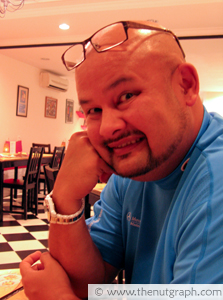
STAND-UP comedian Harith Iskander Musa is dead serious when it comes to being Malaysian.
Of Malay and Scottish descent, he had a hard time ticking a box within the racial category when he was growing up. “Why don’t we get rid of the four boxes and just have one box. Race: Malaysia,” he tells The Nut Graph in an 11 Oct 2010 interview at Samsaraa, the restaurant Harith and his wife of Chindian descent, Jezamine Lim, opened in April 2010.
Come 2011, Harith would have been making audiences laugh here and overseas for 20 years. In October 2010, he was the headliner in the Kings and Queen of Comedy Asia tour, featuring five of the best stand-up comedians from Malaysia, Singapore, India and Vietnam. The show played to a packed house in both Singapore and Kuala Lumpur.
Harith first became famous for being a funny man because of the Shell ads he acted in. Since then, he’s endorsed other recognisable brands such as Nescafe and Celcom.
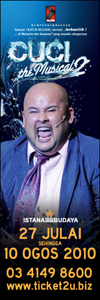 <em>Cuci the Musical</em>
<em>Cuci the Musical</em>Harith has also hosted TV talk shows, acted in theatre, movies and TV serials, and performed in and co-directed musicals, the most recent being the box-office hit Cuci the Musical, together with his buddy Hans Isaac. His most recent production as writer, actor and director is the sketch comedy programme Ten Ten Ten on Astro Warna. He also co-stars with Singapore’s most famous export, Phua Chu Kang, played by Gurmit Singh, in the latest two seasons of Phua Chu Kang Sdn Bhd on ntv7.
Harith realised the value of his work as a comedian when he discovered how much laughing mattered to others. “I get a rush when I do a good show, knowing that people have laughed for half an hour or 45 minutes,” he says, adding that the people who make him laugh are his friends and his wife.
TNG: When and where were you born?
Harith Iskander: 7 Aug 1966. In the General Hospital in Johor Baru.
And did you grow up in Johor Baru?
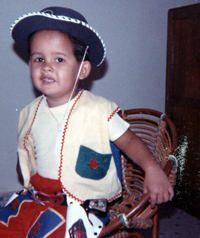
I have no recollection of growing up in Johor Baru (JB) because from a very early age, my parents moved up to KL (Kuala Lumpur). My first memory is of the Mindef camp in Jalan Gurney [where I lived from the age of four to seven]. My dad was in the army.
And then from seven, we stayed in Ampang Jaya while our house in Taman Hillview was being built. Taman Hillview is notorious now because that’s where Highland Towers is. I moved there before Highland Towers was built.
I saw Highland Towers go up, and I saw Highland Towers go down. I stayed [in Taman Hillview] from seven to about 17. Then, I went to study [in Australia].
Can you trace your ancestry?
My mum is from England, born and brought up in Wimbledon. Her parents were Scottish of the Grant clan.
My dad — with the Malays, it’s harder because your name disappears with you — he was from Johor and I believe his ancestry, as with most people from Johor, is from Jawa. Just goes to show that there is no such thing as “Malay, Chinese or Indian”.
Say that again?
You know, when people say, “Are you Malay?” No one is Malay. Everyone comes from somewhere else. The Malays come from Jawa, Sulawesi, Indonesia. There’s no such thing [as “Malay”].
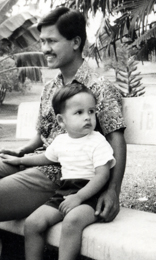
So, how did your parents meet?
They met in the Congo. She was working in New York with the United Nations as a secretary. So, one day the boss walked in and said, “Alright, who is interested in being in the United Nations in the Congo? Because there’s a civil war going on there and we need staff.” She was the only one who put her hand up.
Malaysia, meanwhile, sent peacekeeping forces as part of the Commonwealth. And that’s where they met…And then, [my dad] brought her back to Malaysia where she’s stayed ever since. That was in 1960 or 1961.
Did you ever meet your grandparents?
The first time I went to England was 1973 by which time [my maternal grandparents] had passed away.
And what about your dad’s side?
They were alive when I was born but I have no memory of meeting them.
[I know they were alive because] my nickname as a child was Ali. Because my middle name is Iskander. Iskander is Malay for Alexander, Alexander the Great. And when I was a child, I was called Alex. My Malay grandmother couldn’t pronounce Alex. She pronounced it Ali. So, from the age of a baby till I was 17, I was actually called Ali. Everyone who knew me [in those days] called me Ali.
I only started using “Harith” because “Ali” sounded a bit kampung for work in an office.
What generation Malaysian are you?
My dad was born here in Johor. His dad was born here. I can’t tell beyond that.

What is your strongest memory of the place where you grew up?
It would have to be in Hillview. It was your classic [neighbourhood]. You knew every family in that row. And each one had children who were my age. So, we used to gather daily to play on the road in front of our houses.
It was kites, catching spiders, you know. We played cards with the Ultraman pictures…Then I studied in St John’s (Institution), an all-boys school.
So, you guys never had the notion of race when you were growing up, right?
Not at all.
Did people ever ask you what you were because you were celup, Eurasian?
I was called “cendol” and “celup”. And I think that’s where I developed my sense of humour because there are two ways to react to an attempted insult.
One is to fight back, get angry about it. And two, is to surrender and acknowledge the insult, and go, “Yes, I am celup. I’m cendol, hey, hey!” At which point the intended insult has no barrier to hit so it just fizzles out. Then boys stopped calling me “cendol” and “celup”.
So, ya, I [experienced this], throughout my whole life. [But] I never took any offence [and] in St John’s school, I had a rock band and the members were Kenny Chong, Don Dave Benjamin and Paneer Selvam. Right there, all races covered.
So, when did race become a notion that you became aware of?
I think [maybe it was] when I started stand-up comedy in 1991 that I began to look and notice how race is used. One of my earliest bits for my stand-up comedy which I still use today is the four boxes that we tick under race. How I relate it is, every time there is an accident or a suicide in the paper, [you see race]. And I caught myself [asking], “Malay or Chinese?” What, Indians don’t have accidents? Why don’t we give all races a chance to have an accident?
Why don’t we say, “Malay, Chinese, Indian or Other?” But that begs the question, why do we even ask the question about race? Why don’t we get rid of the four boxes and just have one box. Race: Malaysia. I still use it today.
And it’s still as pertinent and even more relevant…?
Now, it’s become even more relevant in the 19 years that I’ve been doing stand-up comedy. [Before] I only got a chuckle and then a laugh. Now, it actually gets applause. If it’s the right audience, they will literally stand on their feet.
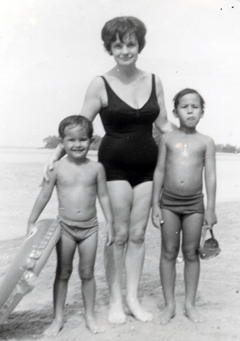
What are the stories you hold onto the most from your family, and how do you connect those stories with being a Malaysian?
My dad grew up as a small boy in the war. He never spoke much about his earlier life. But I do know that [he was in the army] during the communist insurgency right on to the 1970s. [In] 1957 he was already in the army. He was in the jungle fighting the communists during Merdeka. At the stroke of midnight on 31 Aug 1957, instead of shouting, they had to whisper, “Merdeka. Merdeka” lest they be heard by their enemies.
My mum tells the story of when she came over, she wasn’t accepted by my dad’s mum. And the only time she became accepted was when my brother was born.
And so your mother experienced discrimination as well.
Well, obviously. And as far as her parents were concerned, she was going off to Asia to marry a black man.
[…]
And of course, my parents were here in 1969.
You couldn’t have remembered it, right because you were three years old. Did they tell you stories about it?
My dad didn’t. My mum just said there was a curfew and I think my brother was out playing somewhere and some other family had to look after him for the night.
Do you remember or did your parents tell you stories of how the community banded together regardless of race?
We had a Chinese amah. (Pauses) We had a Chinese amah. And we kept her [safe].
And it didn’t matter that there was this clash outside.
Ya.
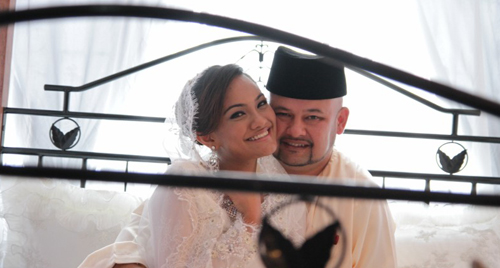
What aspects of your identity do you struggle with the most as a Malaysian, if at all?
This “Malay” thing. Because growing up, honestly, I had problems filling up the four boxes. Because when I ticked “Malay”, my so-called Malay friends would say, “Eh, kau bukan Melayu. Kau celup.” So, for many years, I switched between “Malay” and “Other”. See my mood. Depends what form I’m filling.
Just filling up the forms and the [remarks] from peers as I was growing up — “Kau bukan Melayu” — it was confusing for me then.
And I think only when I got a bit older and more confident about who I was and how it didn’t matter, that I now call myself “Malay”. Not with any extended feeling of pride or comfort but because that’s what I am.
But at the same time, I’m Malaysian first. So, now whenever there’s any form, I actually write “Malaysian” and tick that. Just to piss them off.
Actually, our kids will tick “Malay”, “Chinese”, “Indian”, “Other”. Our kids will have no problems — all!
(Laughs) They will be the quintessential Malaysian.
Perfect (chuckles).
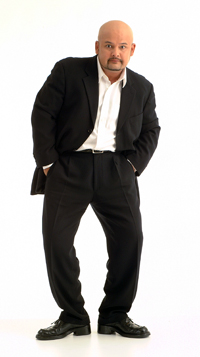
When you do your stand-up comedies, do you consider what kinds of jokes you would tell depending on the racial makeup of the audience?
A good rule of thumb is I make fun of myself first. Let the audience laugh at me. When you open that door, they subconsciously give permission for you to make fun of them. Plus, I’ve had enough experience to deliver my stories in such a way that I don’t belittle any particular race.
Having said that, if I’m doing a predominantly Malay crowd, the only thing I change in my comedy is my timing. Malay comedy timing is different from stand-up English comedy timing. And I would do a third or a quarter of my comedy in Malay…to build rapport.
[But] my comedy is not race-based. I have no so-called Indian jokes. I do the Chinese accent, I do the Malay accent. I don’t do Indian jokes. And I realised, when you’re in school, every school-boy joke is Malay, Chinese, Indian and who kena? The Indian. Or the Bai. Always kena. First, they always kena and if you watch a lot of Malay films, if there’s an Indian [and] “Dey, macha!” [is uttered], the audience laughs. No joke done. It’s become the part.
So, I actually consciously don’t have Indian jokes. It’s been done. Plus I don’t think it’s funny. I have jokes about Bollywood movies. But the comedy comes from the fact that one song can be sung in 12 different countries.
Describe the kind of Malaysia you would like for yourself and future generations.
I tell you, I would love to send my kids to learn Mandarin or Tamil. Have both as part of our education.
Language is a bridge. Whenever you go to [another country], the first thing you do is you learn a few words of the language and you spend the rest of your time picking up words.
I wished I learnt Chinese. And I definitely want my children to learn these languages.
So, future of Malaysia? Bahasa Malaysia is a compulsory language but a Chinese and an Indian dialect should be a compulsory language as well. I think if we can understand some of the language, we’ll understand i.e. accept whatever we didn’t accept before muck quicker. All the trouble in the world actually comes from fear of not knowing.
I went to a friend’s funeral service recently. Did you know Dicky Cheah? And it shouldn’t even be a heart-warming moment but it was a heart-warming moment when I walked into the [church] service and there were non-Christians there. There were Malay [Muslims] there, in tudung, his friends.
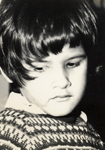
So, what you’re saying is you want a Malaysia where going to other people’s places of worship would be the norm rather than the exception?
Yes. Only because it’s just a building. There is no religion coming up from the ground.
And this great fear of the Manchester United jersey and the cross and this TV3 ad. It’s quite demeaning because are you telling me that my faith is so weak that I will be so easily swayed if I wear a Manchester United shirt? Are we Malays really that weak? ![]()
The book Found in Malaysia, featuring 50 of our best interviews plus four previously unpublished ones with Datuk Zaid Ibrahim, Tan Sri Rafidah Aziz, Datin Paduka Marina Mahathir and Ramli Ibrahim, is now available at all good bookstores for RM45.


siew eng says
My fav line: “There is no religion coming up from the ground.”
Harith deserves a State award for similar reasons that Lat is loved.